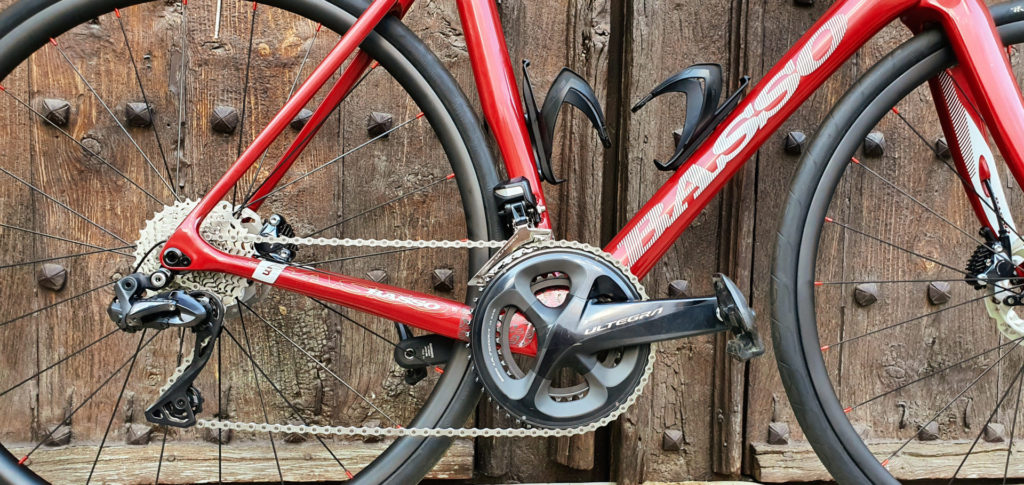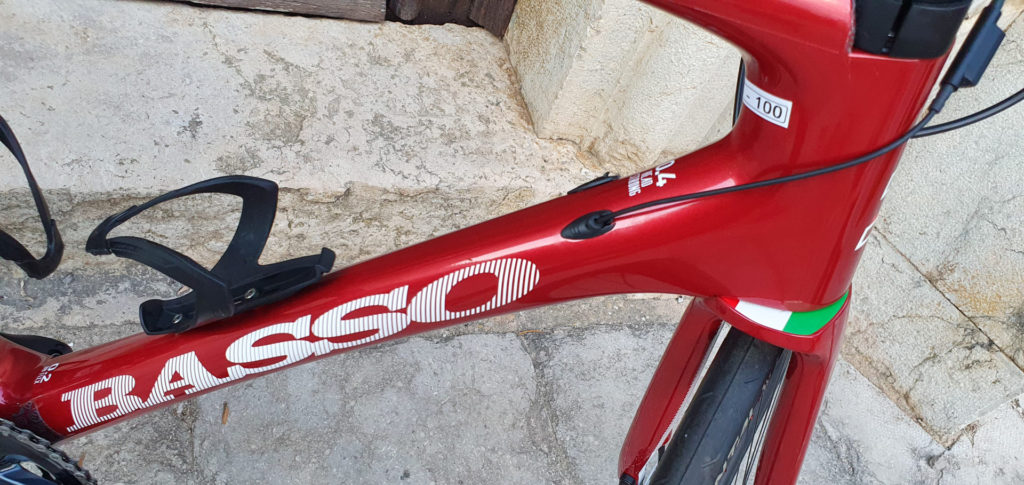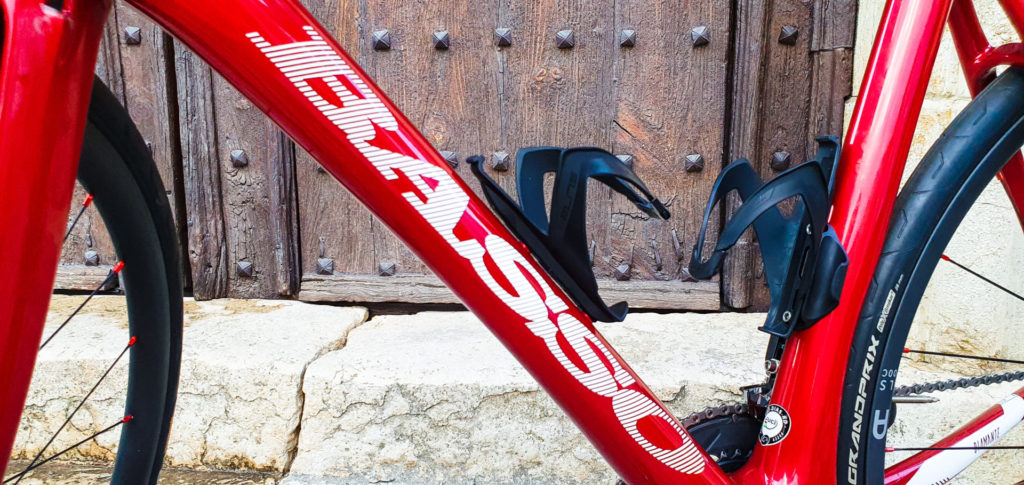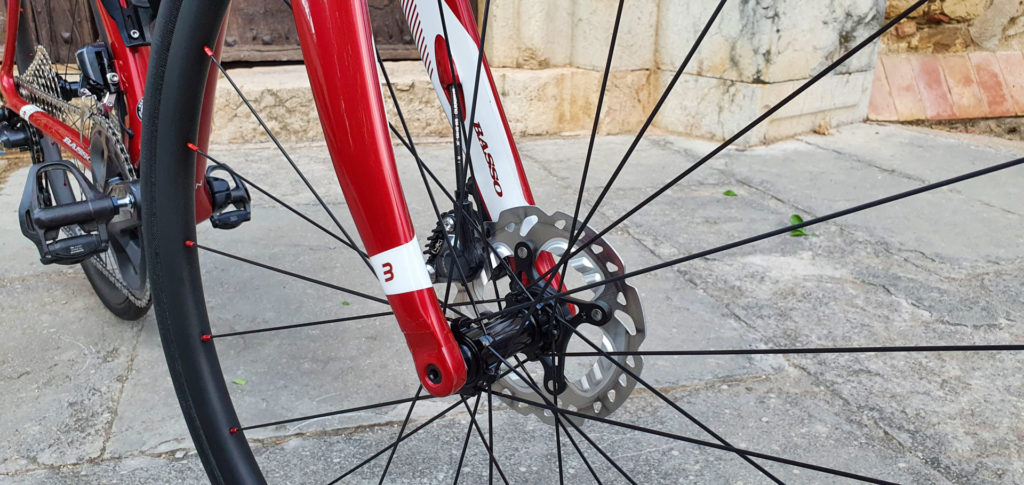Penedes Priorat Wine and Cava Cycling Tour
Riding Days
5
Number of Nights
4
Total Distance
340 km
Total Climbing
7,700 metres
Difficulty
3/5
At a Glance
Penedes Priorat Wine and Cava Cycling Tour - he chances are that you have never heard of this area let alone be able to locate it on a map of Spain. If you know your Spanish wine you will know that 'Priorat' is an important wine-growing region, located in the southernmost area of Catalunya, not far from Barcelona. It is one, of only two, wine demarcated regions in Spain that attain the highest quality standard of DOCa - denominación de origen calificada (DOQ in Catalan).
So what makes Priorat special? Imagine row upon row of ordered and immaculate vines stretching out across the hilly landscape but punctuated with impressive limestones rock formations, roads that are sinuous and butter-smooth with hours and hours of sunshine and impressively low rainfall. Riding around this area you wonder why it is not more well known, the roads seem perfectly designed for cyclists with numerous climbs, all of the manageable gradients and hardly any cars to speak of. You've just discovered an unknown cycling paradise!
Our Penedes Priorat Wine and Cava Cycling Tour will allow you to fully explore the area, with a full circuit of the Montsant mountain in the National park, exploring deserted roads winding through the vineyards, past ancient aqueducts and into enchanting mountains towns such as Prades. You'll be immersed in the culture of this area, feasting on the local cuisine and washing down with a glass or two of the delightful Priorat or Montsant wine.
Tour Highlights
-
Asphalt
Penedes Priorat Wine and Cava Cycling Tour
Book Tour
€1,300.00 – €2,425.00
Overview
Penedes Priorat Wine and Cava Cycling Tour - About REGION & HISTORY
From the dry, rocky soils of Priorat, in remote Catalonia, has sprung an ancient winemaking tradition, awe-inspiring monastic architecture and a proud cuisine both frugal and flavoursome.
As soon as you turn your handlebars inland, away from the busy coastline, a network of finely crafted Spanish roads open up. You can’t help but be wowed by the rolling countryside, the gentle climbs of the Priorat region, hills covered in almond and olive groves and vineyards, everywhere. Montsant National Park, UNESCO protected 12th Century monasteries and dramatic, deserted villages. Did we mention the climate? Reports of 330 days of sunshine a year are music to the ears of those battling Northern Europe’s winter and looking for a spring training camp destination. This fantastic climate makes cycling in shorts possible for almost all months during the year.
Priorat
History of Priorat
The wine district has two thousand years of history. Tarragona, located east of Priorat, was the Roman capital of Tarraconense and already the Romans began making wine in the Priorat area. So wine has been produced in the area called Priorat today for a period of at least 2000 years.
Priorat was occupied by the Saracens at the beginning of the 8th century and controlled by the Moors until the XIIth century. Priorat preserves vestiges such as the oldest mosque in Catalonia and in the beautiful city of Siurana there is a famous church built in romanesque style in the 12th century.
The name Priorat
The name ‘Priorat’ comes from the prior of Scala Dei. PRIOR-AT means the land belonging to the Prior.
Siurana
Upon arriving at Siurana you will discover a small fairytale village that has a deep-rooted memory of endless sieges and improbable conquests. Perched on a rock in the river, Siurana was thought to be impregnable, above a reservoir of the same name.
If you look closely at the surrounding cliffs, you will realise why no one was able to conquer it for three centuries, and why the ending was so tragic. Before being overwhelmed by the Christians, the Moorish queen, Abdelazia, preferred to cast herself off the summit with her horse. The animal, terrified in its futile resistance, left the permanent imprint of its horseshoe on the rock.
It was a defensive point and impassable border with the Islamic world. Siurana was the last Moorish stronghold in Catalonia and fell at last in 1153 after the more important bastions of Lleida and Tortosa had fallen.
Nowadays, visitors can wander around a charming hamlet with cobbled streets and look at the remains of the Moorish castle presiding over the entrance to the village. At the foot of the mountain, there is a reservoir with clean and calm waters, where one can take part in all sorts of water sports.
The most impressive building nowadays in Siurana is the Romanesque church. It was built after Berenguer IV’s troops conquered Siurana, in order to bring Christianity back to the region. The doorway has been exceptionally well preserved with a figurine tympanum, framed by three rounded archivolts resting on capitals with various decorative motifs.
Cathedrals of Wine
As you’re riding around Priorat you will notice that wine is a way of life, you may even say there is a religious dedication to wine. That is no more evident than in the buildings which house the Cooperatives of the villages within the Priorat boundaries. The buildings are impressive and cathedral like in their structure and decoration.
Some of the most impressive ‘celler cooperatiu’ are located in Cornudella, Falset and Gandesa, all dating back to the early 1900’s and designed by architect, Cèsar Martinell i Brunet. He was a young architect at the time and disciple of Antoni Gaudí, he constructed buildings in what became known as ‘Catalan modernism’ style.
Collectively these cellars are known as the ‘Cathedrals of wine’ and were created as a result of the different way that the local population had to collaborate after the ‘phylloxera’ decimated the vines and economic fortunes of the region in the late 19th century.
Climate
Gearing
Details
What's Included
*Meals are included up to a specific budget after which a supplement will be applied
What's not Included
Itinerary
Our La Fuga guides will pick you up from Barcelona airport and transfer you to your hotel, a journey of just over an hour. Once checked in, your bikes will be assembled or fitted if using rental bikes. There should be time for a quick spin to the town of Escaladei before returning back to Cornudella.
There will be time for aperitif in the town ahead of dinner at a local restaurant. Your guide will brief you over dinner about the format of the next few days of riding. After dinner, you can explore the local streets and take in the spectacular views of the mountains as the sun sets.
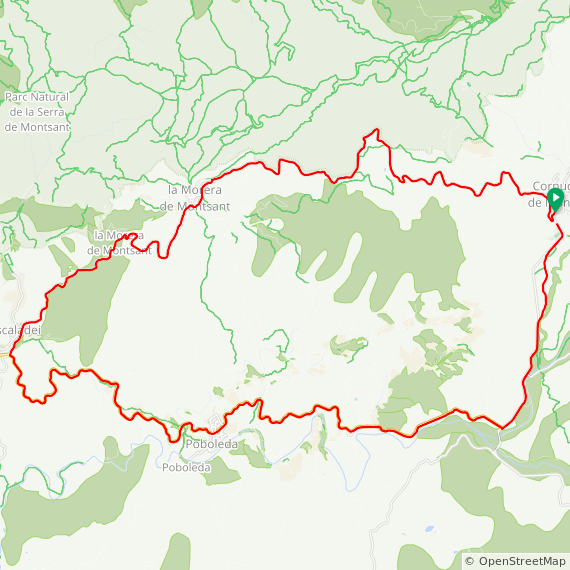

Today’s ride is a highlight of the region. The mountain of Montsant (holy mountain) towers over the area with its big rock formations looking impressive from every angle and in differing light.
The ride will take small perfectly smooth roads through small villages, climbing and falling with the undulations of the terrain as we circumnavigate the mountain. The vines stretch out in front of you as gaze up the mountainside, this makes if particularly difficult to harvest these vines but it allows spectacular views as we ride around them on our bikes. Lunch will be taken as we start climbing to the higher elevations as we ride around the northern side of the mountain.
Once close to our starting point there will be the option to take the road the beautiful village of Siurana. With it’s pristine cobbles streets and views looking down on the the valley and lake below, there is no better place to end your ride. All that remains the is the descent back to the hotel.
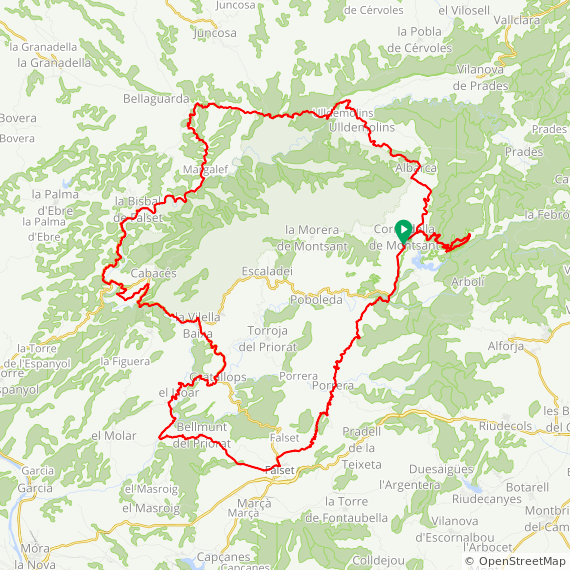

After two nights in Cornudella you’ll be heading to Falset for two nights on todays ride. You’ll immediately be leaving the Priorat vineyards behind you’ll be heading into the mountains of Prades today. The vegetation is markedly different, you’ll be riding through deep forested terrain and gazing over rocky outcrops whilst riding through small winding roads. After a relatively gently uphill start to the ride you’ll arrive at the town of Prades. The town gives it’s name to the mountain range and sit’s on the top of the ridge at a height of 1000metres. We’ll stop for a coffee in the impressive village square before heading off for some more riding.
You’ll continue through pine and oak tree lines roads winding your way up and down before descending down to the warmer plains which lead to the Costa Dorada. You’ll head back inland past the lake at Riudecanyes and up the gentle slopes towards Porrera, re-joining the Priorat area that left this morning before heading to a the next hotel at Falset.
Tonight you’ll head into the town for meal in the town square at a local restaurant.
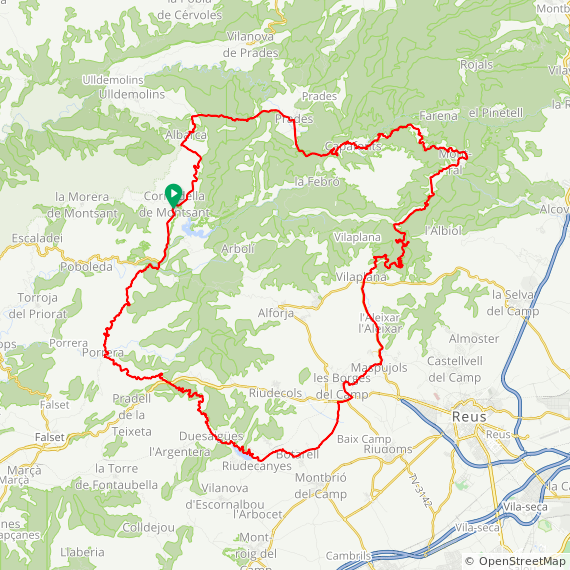

Starting a new town today you’ll head out in a different direction to explore the Parco LLaberia. The Vuelta a España and the Volta a Catalunya professional races have both been through this area in recent years so it may be difficult to go home the top of any Strava segments.
After a gentle uphill start you’ll be crossing over into the national park of Llaberia and up the first climb of Coll de Jou. We’ll set up a lunch stop before the next longer climb up the Coll de Faixes. The climb is a fairly gentle and just short of 10km. For those wishing to take on a challenge there is an additional climb to the village of Llaberia itself. From the top you’re offered spectacular views over the Sierra de Llaberia.
The descent from the top of the Coll de Faixes takes you 20km down, almost to the base of the Ebre river before climbing back into the Priorat region and back to Falset.
Tonight’s meal will be taken in the town and we’ll be toasting the excellent few days exploring the region and the culture of this unknown but spectacular corner of Catalunya.
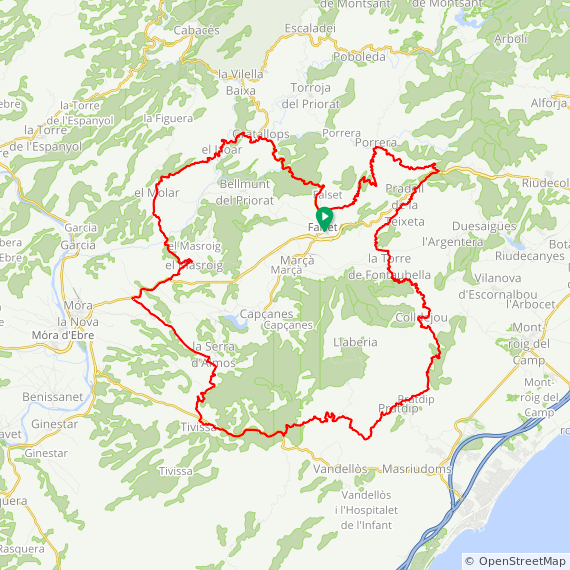

Accommodation
El Palauet del Priorat is located in the town of Cornudella de Montsant in the heart of the Priorat region. The hotel and town affords views out over the countryside towards Siurana and the lake below.
The hotel has recently been reconstructed with a tasteful and sympathetic consideration of the original building but brining the facilities up to date for a luxurious and delightful stay in this super little town.
The Hotel Sport is located in Falset one of the principal towns of the Priorat region. It caters specifically for the sporty guests who wish to explore the region, on foot, or by bike.
The hotel offers a traditional Catalan restaurant allowing you to refuel with a quick snack after the ride or to indulge further with a glass of local wine over a full evening meal with the group.

